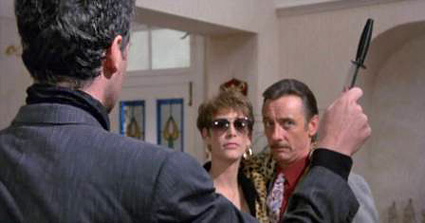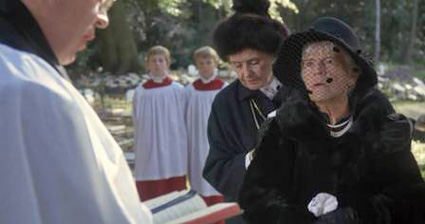
No cinematic genre lends itself less for repeated viewings than comedy. Finding a truly funny picture is hard enough (not that you could tell from the typical reactions at a "Fockers" screening) and besides, how many times can people laugh at the same joke? Comedies also tend to age the worst. Among those that I recall once driving audiences wild here in México were "The Party" (1967), starring Peter Sellers, with all the guests falling into a pool full of bubbles, and Peter Bogdanovich's zany screwball feature "What's up Doc?" (1972), but watching them today mostly leaves me cold.
Even with some of the best and more recent examples like "Animal House," I have to distance my viewings to about once a decade and somehow that's still not quite long enough. Let's face it, once you know that the horse will die from a heart attack in Dean Wormer's office, you can't expect to react as you first did. These precedents make it hard for me to figure out the perpetual hilarity of Charles Crichton's "A Fish Called Wanda" (1988). Not that this can be described as a new movie anymore and certainly not that I haven't seen it enough times.
The film's main subject is the robbery of $13 million in diamonds from a London business by a gang of criminals, but this is just an excuse to get this group of odd people together and have their eventual fates hinge on each other's unpredictability. The picture was made in the same mold as "There's Something About Mary" (1998) years later, with a small group of characters fighting to keep the prize for themselves and spending two hours backstabbing each other.



The team is made up of stuttering animal lover Ken Pile (Michael Palin) loyal aide to Georges Thomason (Tom Georgeson), the brains of the operation, as well as by the arrogant weapons man Otto West (Kevin Kline) and master manipulator Wanda Gershwitz (Jamie Lee Curtis). They are later joined by local barrister Archie Leach (John Cleese), who's bound be the first to learn the whereabouts of the hidden loot, making him Wanda's prime romantic target. Not only is the movie not shy about stereotyping the British as uptight and the Americans as rude, gun-loving cretins, but it makes a point of exploiting this subtext, adding animosity to its characters' already erratic relationships.

The core theme in Crichton and Cleese's script are the crooks unusual personal fears. When a comedy dedicates its entire pre-credit sequence not to introduce the characters themselves but rather to convey their idiosyncrasies and soft-spots, you have to expect that sooner than later those weaknesses will be put to the test. This is the main factor that took the film's otherwise standard, comedic situations and made them truly sublime.
The the accidental mauling of some doggies belonging to a witness (who happens to be a mean little old lady) in all sorts of wacky ways could have never sounded like an innovative comedic concept in theory (more like something out of a Road Runner cartoon). It is in the context of Ken's deep suffering after each demise that the canine tragedies becomes increasingly hilarious as opposed to losing any steam (not that the singing altar boys, ringing church bells and burials at an actual pet cemetery could have possibly hurt).



Think also of the moment where Archie takes off his clothes on a bear carpet. If there's been a constant in every sitcom, it's that whenever a character suddenly gets the urge to do something outrageously stupid, another will inevitably come into the room and become startled. That happens in this movie but the scene becomes special because Crichton doesn't just stop there, like most comedies normally would. He adds gas to the fire by bringing a whole family into the picture, with the kids being the first to take a peep and Archie blocking their view with a photo of the same woman whose indignation is there for us to see. Once Leach's uptight and courteous nature is mixed with these bizarre circumstances, something as preposterous as his having to make small, polite talk in the nude, almost feels natural.


It's almost astonishing that some of the comedy bits in the picture were able to work at all, let alone this well. Take for instance the slapstick involved in the scene that has Archie's wife coming home unexpectedly, a montage where the guilty parties use such outrageous justifications for their conduct as a husband welcoming his wife home from a simple night out with champagne and jewelry plus the threat of a CIA raid, and yet the performances, timing and editing make us buy this sequence completely.
Some of the other routines only succeed because to the way they are progressively presented to the audience. Try to imagine how little impact there would have been from seeing Otto hanging Archie from a window without first disguising the fact that he's actually hanging up side down (only to later make this evident by turning the camera 180°). Each comedy sequence required a different approach and the feeling at the end is that in every case the filmmakers swung for the fences, and never missed.


The problem with most contemporary comedies is that sooner or later they succumb to the temptation of raising the level of their vulgarities in an attempt to create hilarity. "A Fish Called Wanda" also has its share of this but they are never used unless they derive from their characters' natures, no matter how bizarre. Crichton's directorial style shows an obsessive attitude throughout, dealing repeatedly with the same subjects such as illicit rendezvous that won't reach their conclusion, incredibly rude drivers, and constant appeals for apologies (the character that's always requesting one ends up being the one delivering his own, at gun point).
Kevin Kline has been quoted as saying he initially had no idea where his character or the picture was going; watching him here, this is not difficult to believe (he won a supporting Academy Award nonetheless). Klein's Otto spends much of his screen time doing such nonsense as inhaling footwear and his own armpits and engaging in nasty conversations with himself. The performance is way over the top and sometimes plain mean but is so full of energy and of the very stupidity that his character claims to despise, that we can't help but laugh. Without these traits, the sequences involving Kline such as the hilarious fish-eating interrogation, would have simply felt cruel and excessive.

Even in a movie where most of the character's actions are plain grotesque, some of them become more relatable than others (what can your say about a group where the second nicest member enjoys killing little old ladies?). Archie is the one most audiences can identify with as his fears of embarrassment ring much closer to home than say, Otto's reaction to being called stupid or Ken's phobia about innocent animals Leach has to suffer such indignities as being forced to be courteous while in the nude and having a muse and a wife with nearly identical names, meaning he'll inevitably mix them at worst time. Wanda's biggest sin is being well aware of how far her charms can take her, and by film's end, the worst uses that knowledge to control people who deserved that and worse.

"A Fish Called Wanda" isn't just one of the funniest pictures of all time but also one of the most effective, a unique achievement considering the long shot that every one of its unusual comedy routines faces in working. On paper, their appeal could only been obvious to their creators. This is also one of the most politically incorrect movies in memory, being equally offensive to speech disabled people, animal rights defenders, animals in general, the elderly, lawyers, Brits, Americans and so on. Forgiving the film isn't all that difficult as we get to enjoy seeing the offenders suffer plenty themselves and besides, if there's one thing to learn here is that a comedy can get away with most any kind humor as long as it is truly funny.

GERARDO VALERO is Roger's FFC from Mexico City, where he lives with his wife Monica. Since 2009 Gerardo has been writing essays for RogerEbert.com, and for the last year has been writing a daily, blog about film clichés and flubs (in Spanish) on Mexico's Cine-Premiere Magazine.
Gerardo Valero is lives in Mexico City with his wife Monica. Since 2011 he's been writing a daily blog about film clichés and flubs (in Spanish) on Mexico's Cine-Premiere Magazine. His contributions to "Ebert's Little Movie Glossary" were included in the last twelve editions of "Roger Ebert's Movie Yearbook."





